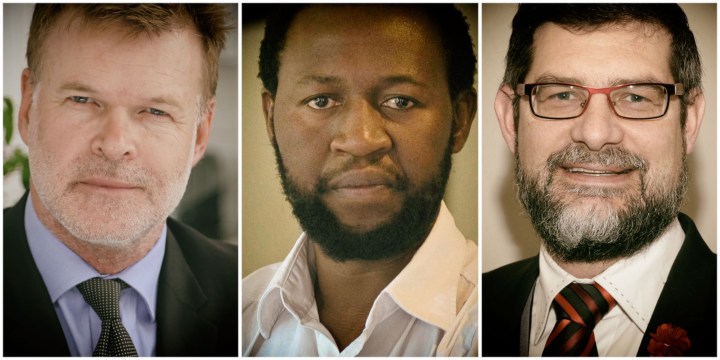DAILY MAVERICK WEBINAR
‘Very toxic’ – public service culture in South Africa ‘not accountable and not transparent’, say experts

South Africa’s democracy is not on firm ground as poor public service continues to undermine the concept of administrative justice, which aims to empower citizens, a Daily Maverick webinar has heard.
Administrative justice has played a pivotal role in the collective struggle against apartheid and its significance continues as South Africa approaches the 2024 elections.
This was the theme of a Daily Maverick webinar hosted by author, political analyst and professor of public law, Richard Calland, in partnership with the Inclusive Society Institute.
Calland hosted panellists William Gumede, associate professor at the School of Governance at the University of the Witwatersrand, and Geo Quinot, professor of law at Stellenbosch University.
Gumede is also the independent convenor of the Multi-Party National Convention.
Calland began by acknowledging the Public Protector interviews held by a parliamentary ad hoc committee on the same day as the webinar, saying “the Public Protector is an extremely important person in our constitutional system” and that the “premature” end of suspended Busisiwe Mkhwebane’s tenure was “strongly justified”.
Read more in Daily Maverick: Acting Public Protector Kholeka Gcaleka named as replacement for Busisiwe Mkhwebane
Calland said the role of the Public Protector fell within the ambit of administrative justice since both focus on public power.
Administrative justice concerns how the public interacts when the government or those in power act in ways that are unlawful, unfair or unjust. It encompasses matters of everyday importance to the citizens, such as housing, education, healthcare, immigration, planning, social security and taxation.
“Administrative justice, much like the Public Protector, is very much concerned with public power and how public power is used or not used in the public interest… and then, of course, we are probably less than a year away from what is going to be a very significant election,” said Calland.
The discussion also explored the ways in which the apartheid era was transformed by the late professor of law at Wits, Etienne Mureinik, who, according to Calland, “was a very important figure in the development of public law principles in this country”.
“What I learned was that he had come up with this expression of the administered laws being about replacing the autocracy of apartheid and the abuse of power, cruel and criminal abuse of apartheid, with a culture of justification, and that is a lovely expression”.
Mureinik, as a constitutional law expert, played a significant role in the country’s transition to democracy. He was a member of the Judicial Service Commission and assisted the Association of Law Societies in its objections to the Constitution. Mureinik also helped draft the Bill of Rights and was the Democratic Party’s constitutional adviser for the 1993 negotiations as well as the negotiations for the new Constitution.
Read more in Daily Maverick: The key to renewal in South Africa is reform of the criminal justice administration
Quinot described administrative justice as “instrumental functions of forcing administrators to explain… to bring people into their trust.”
During apartheid, human rights were violated simply because those in power could take authoritative decisions without having to explain. The mere point that they were administrators was enough, but the democratic shift and the new Constitution introduced public power.
“Just because you are sitting in a particular position, you are wearing the uniform, you put the stamp in your hand, means absolutely nothing. Your mandate to take decisions comes from the ability to justify that decision to the person that is most vulnerable, the one that is going to be most directly affected. It does not matter if you are the president of the country or the municipal member or whoever. You are obliged to explain,” Quinot said.
Quinot explained the culture shift caused byMureinik’s role in framing the laws of the new South Africa. “It’s really fundamentally also about the type of democracy we have got and [Mureinik’s] depiction of a shift from a culture of authority to a culture of justification. I think it is a really good way of understanding the much broader shift to constitutionalisation.”
Gumede pointed out that public service in South Africa is weak. “We do not have the public servants that are capable and understand error within the constitutional dispensation.
“The big debate in the country has been about public service and about the public service culture. The culture is very toxic on the one hand, and on the other the culture is not accountable and not transparent… they do not see any reason to explain anything and that has undermined very much the concept of administrative justice.”
Citing the failure of South Africa’s former and current presidents to review and build a competent and professional public service, Calland said that “it was in the National Development Plan 10 years ago but it simply has not been executed… why, even if there was a change in government next year, can one have any confidence that there would be a shift?
“I would say that the governing party [has] more often than not in the last year [been] driven by corruption than the Constitution, and that causes the problem.” DM


















Noooooooooo!!! Really??? Well slap me with a pap Snoek